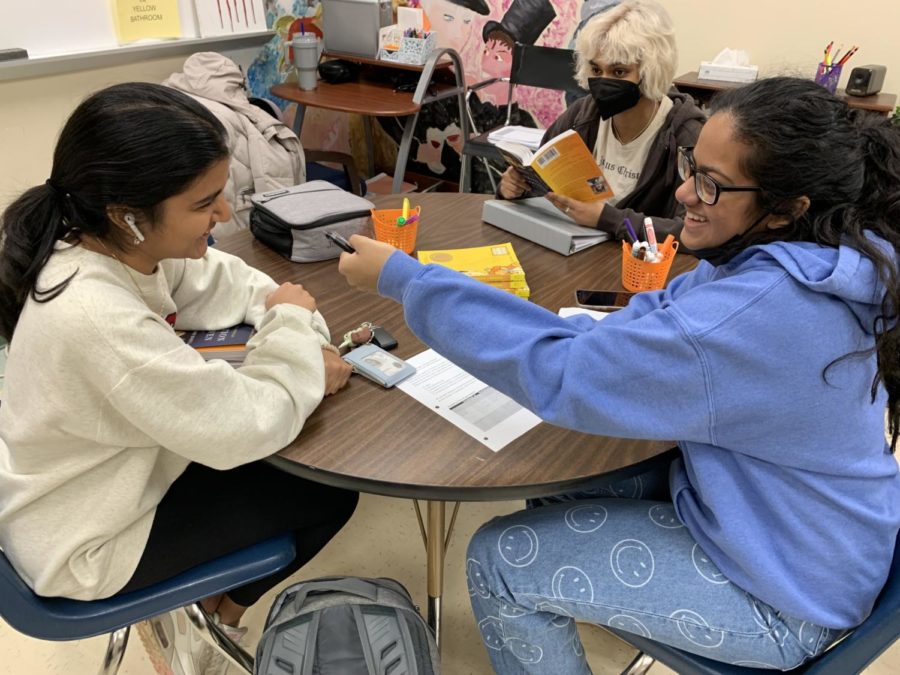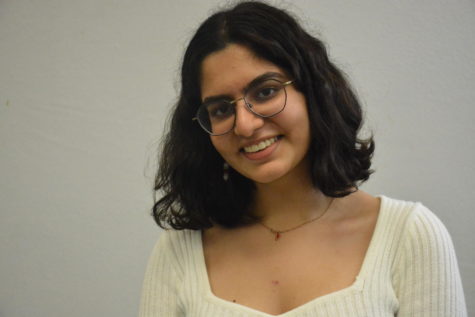Effective interview strategies support student applicants
Senior Ashika Ganta practices answering common questions with seniors Mags Mathew and Saniyah Manaal ahead of her interview for admission into Northwestern University’s music school on Friday, Dec. 2.
January 12, 2023
While conferencing to achieve career and academic goals appeals to some, the concept strikes fear in others. Regardless, speaking with an executive scouting for a company or university may prove significant to securing a spot at both.
“The resumé or the application gets you in the door, but that face-to-face is really key to giving a good impression and demonstrating your knowledge,” marketing education teacher Jennifer Piotrowski said.
As part of marketing education, Piotrowski discusses with students “workplace readiness,” imparting strategies for completing an application and interview preparation. Although employers may not require one in addition to the application, the possibility of receiving a job offer declines from 37% to 10% by neglecting to participate in an interview.
“When you get ready for that interview, if you get one, you want to do a little research on the company,” she said. “Show them that you’re interested. Research the types of positions you might have and what the tasks are. Being able to turn that knowledge on your interviewer when you’re answering questions and ask an interviewer a couple of questions at the end shows that interest.”
The interview is when individuals are able to emphasize their strengths, describe the factors that led to their applying and contextualize certain aspects of their resumé, in addition to answering other common questions. However, the manner in which interviewees carry themselves also factors into their overall performance.
“I interviewed for a job at Cold Stone Creamery in Herndon, and my boss told me that he wanted to know more about me and my skills,” senior Becky Paul said. “It’s really easy to think of all these great things about yourself and present them to your interviewer, but at the end of the day, they just want you to be real. Sit up straight, talk confidently, don’t fidget and be casual.”
Alongside heeding these tips, dressing well can be key to standing out during an interview. Depending on the occasion and location of the interview, this may entail wearing a suit or less formal attire such as a button-down shirt and pants. Ultimately, an interviewee’s appearance might impact how they are perceived; after all, it takes one-tenth of a second for people to form an impression of someone they are meeting for the first time.
“Almost all top schools will try to do some type of interview, a lot of times with alumni, almost always at some coffee shop and quick,” college and career specialist Khristie Greiner said. “I will see college admissions officers say you can dress comfortably, [but] I strongly disagree with that advice. If I were doing an interview and I had a student that came in a pair of sweats, and then a student that took the time to dress up, I’m going to remember that. It doesn’t look kindly on the person that took no interest in looking nice for this interview, like it’s a waste of my or their time.”
The interview process does not necessarily end there. According to Forbes, sending the interviewer a concise thank-you note combining genuine gratitude for their time and a reiteration of important points covered during the conversation can distinguish a successful applicant from one on track for rejection.
“It shows so many things that people don’t realize it shows,” Greiner said. “The reason we don’t do it is it takes time out of our day. Well, time is our number one commodity, right? You can’t get it [back], and the fact that you spent some time writing a thank-you note speaks volumes to people.”
Students may refer to the College and Career Center and the “College & Career Planning” page of the CHS Student Site for further insight and resources pertaining to the interview process.
“Remember that human beings are human beings,” she said. “They’re not expecting you to be the president of the United States that’s being interviewed. They’re expecting you to be nervous. That’s okay—that’s absolutely okay.”



